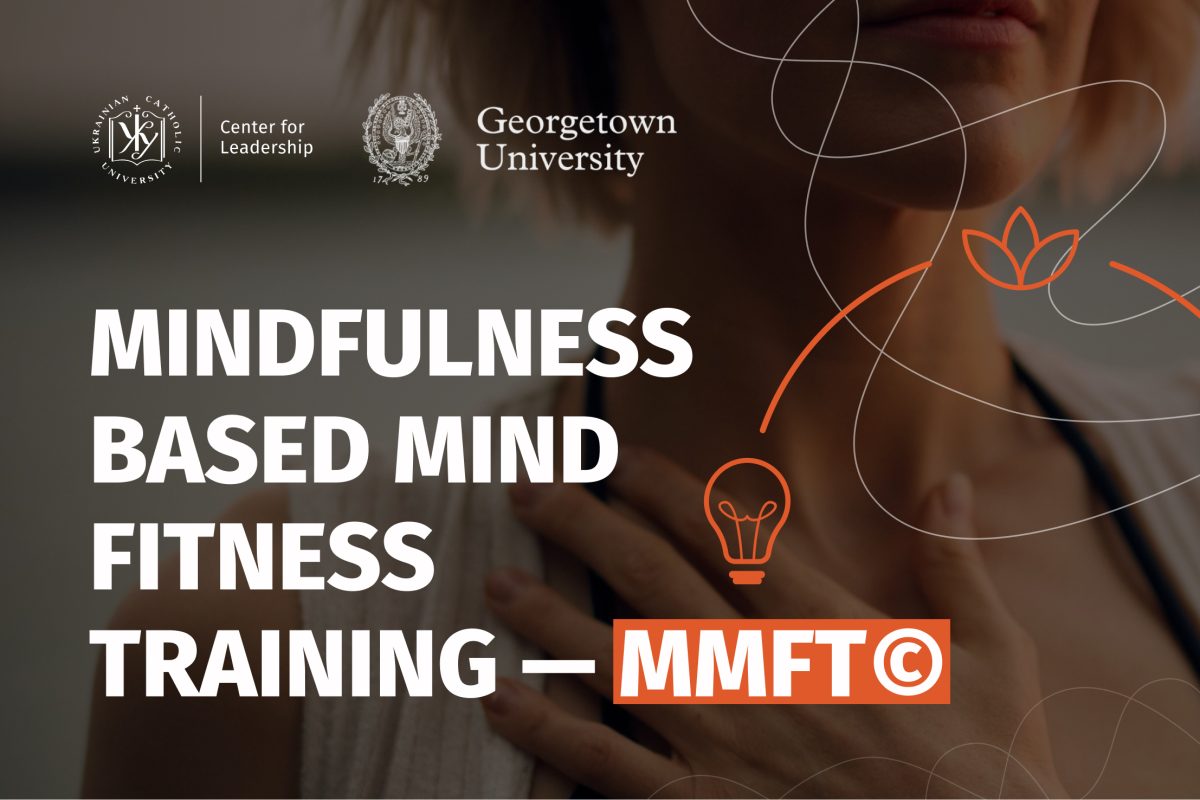
Study to understand the impacts of MMFT©
Researchers at the Center for Leadership of Ukrainian Catholic University in Lviv and Georgetown University in the United States are conducting a study to understand the impacts of Mindfulness-based Mind Fitness Training (MMFT©).
Are you over 18 years old and currently reside in Ukraine? Are you interested in learning new skills and techniques to handle stressful situations? If so, we would like to hear from you.
The purpose of this study is to assess how a three session program where participants learn three MMFT© exercises affects their mental health.
We would like to invite you to take part in this study, where you will be randomly assigned to one of two groups, and we will ask you to complete surveys at two time points. Randomization means you will be assigned to a group based on chance, like a flip of a coin. Neither you nor the researcher chooses your assigned group. You will have an equal chance of being in either group.
Here are the schedules for the training for each group:
| Group 1: | Group 2: |
| Sat, July 26, 15:30-18:30 Kyiv time Sat, Aug 9, 15:30-18:30 Kyiv time Sat, Aug 16, 15:30-17:00 Kyiv time | Sun, Aug 17, 15:30-18:30 Kyiv time Sun, Aug 31, 15:30-18:30 Kyiv time Sun, Sept 7, 15:30-17:00 Kyiv time |
Could you be available for one of these two groups? If not, you are not eligible for the study.
If you are available and interested in participating in this study, please register for an informational session to learn more about the study and your potential participation, including the opportunity to ask questions.
About the Program
The MMFT© program was developed with two main goals: to help people expand their window of tolerance for stress arousal, and to do so in a way that is sensitive to trauma and dysregulation. In this way, MMFT© seeks to improve functioning before and during stressful experiences, as well as to ensure more effective recovery from them, paying particular attention to the fact that participants may have varying levels of prior chronic stress and trauma exposure.
MMFT has three parts:
- mindfulness skills training;
- an understanding of the neurobiology of stress and resilience, and body-based self-regulation skills training to regulate the autonomic nervous system;
- concrete applications of both types of skills to participants’ personal and professional lives.
This blend of mindfulness skills training with body-based self-regulation skills is crucial for increased psychological and physiological resilience and enhanced performance in high-stress situations. It also facilitates individuals widening their windows of tolerance for stress arousal, so that they can interact more effectively with their complex external environments. Thus, a major goal of MMFT© is to improve individuals’ self-regulation and resilience, at both the micro- and macro-levels.
At the micro-level, this means improving individual self-regulation in the mind-body system—with better functioning during stress and more complete recovery back to “baseline” afterwards. As individuals learn to direct their attention in ways that support discharging the effects of prior stress arousal, they may facilitate their mind-body system returning to a functioning allostasis and thereby decrease both their allostatic load and cognitive, emotional, and/or physiological symptoms of dysregulation.
As allostatic functioning improves, individuals may actively redirect focus from inner symptoms towards the outward environment. Thus, awareness, physiological and emotional self-regulation, and impulse control – hallmarks of self-regulation at the micro-level – each pave the way for more successful, connected, and supportive interpersonal interactions and more agile and adaptive decisions in complex environments – hallmarks of self-regulation at the macro-level (Stanley, 2019).
MMFT© draws from three lineages:
- the warrior traditions;
- mindfulness training;
- body-based trauma therapies for re-regulating the nervous system and survival brain after trauma, such as sensorimotor psychotherapy (Ogden & Fisher, 2015; Ogden, Minton, & Pain, 2006), Somatic Experiencing (Levine, 1997; Payne, Levine, & Crane-Godreau, 2015), and the Trauma Resilience Model (Leitch, Vanslyke, & Allen, 2009).
This integration of mindfulness skills with body-based self-regulation skills sets MMFT© apart from other mindfulness training programs. MMFT© is also anchored in the warrior traditions, a form of domain-general training that was explicitly designed to improve performance in high-stress situations. Across all human cultures over millennia, the warrior traditions included structured teachings and techniques that have historically prepared warriors to engage in heroic action on behalf of others, in the service of protecting their communities. The traditions focused on teaching fungible skills and qualities, applicable in any situation, and then trusted warriors to access and apply those skills and qualities whenever and however the particular circumstances required. Two qualities stand out as the most important across all warrior traditions to be cultivated via this domain-general training: wisdom and courage. Wisdom and courage are foundational qualities of character that facilitate a range of different leadership and character dimensions.
Using these diverse lineages, MMFT© aims to cultivate two core skills: attentional control and tolerance for challenging experience. Attentional control is the ability to direct and sustain attention deliberately on a chosen target over time. Tolerance for challenging experience is the ability to pay attention to, track, and stay with such experience without needing for it to be different. Such challenging experiences can be external (e.g., harsh environmental conditions or difficult people) or internal (e.g., physical pain, stress activation, intense emotions, distressing thoughts, nightmares, or flashbacks). These core skills undergird other competencies needed for agile and adaptive decision-making in high-stress environments, such as situational awareness, emotion regulation, impulse control, and mental agility (Stanley, 2019).
One of MMFT’s© strengths is that it has been tested through neuroscience and stress physiology experimental research. These studies have tested different MMFT© variants, ranging from 8-24 hours of classroom instruction delivered over eight weeks. Arguably the most effective variant is 20 hours of classroom instruction, which includes eight 2-hour sessions, a short individual practice interview in the third week, and a 4-hour practicum in the sixth week to refine mindfulness and self-regulation skills.